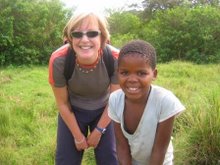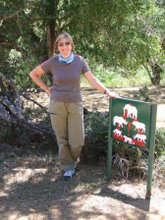The Nairobi-Mombasa train is fantastic. Hercule Poirot might have looked a little out of place among the slightly motley collection of travellers and locals who came to dine, but he would have approved of the classic gong rung to announce dinner, and the four-course meal it introduced. The menu could have come from the early 1900s, heavily influenced by the worst of English cooking - watery vegetable soup, overcooked fish, roast chicken and very boiled vegetables, finished with crumbly cake and custard. Still when served by white-coated attendants, on monogrammed china with embossed silverware, all is forgiven. Talking of embossing, there are a number of acronyms in use which tell the story of the railway. EAR&H - the original, on the silver cutlery, butter dish and sugar container; KUR, then post-Amin KR on the china, and now RVR (Rift Valley Railways) on our tickets as East Africa once again tries to link up their lines, no doubt for economic reasons. There's quite a bit of cooperation among Uganda, Kenya & Tanzania, which stretches to our single entry visas being valid for multiple entries to and from the East African nations.
Our compartment is a joy too - just two berths which are turned into snug beds while we eat dinner, and with a complicated webbing system so Max won't fall out of the top bunk should anything untoward happen during the night. We have a wardrobe (sadly unopenable), a little sink and a mirror, and there's even a ladder to make scaling up to the top bunk manageable for anyone.
Our compartment is a joy too - just two berths which are turned into snug beds while we eat dinner, and with a complicated webbing system so Max won't fall out of the top bunk should anything untoward happen during the night. We have a wardrobe (sadly unopenable), a little sink and a mirror, and there's even a ladder to make scaling up to the top bunk manageable for anyone.
Our very fabulous compartment on the African version of the Oriental Express.
After dinner finishes it's close to 9pm, time for us to retire to our compartment for the evening. The night is broken by the usual stops and starts and we're both still sound asleep at 7am when the breakfast gong sounds. It's bacon and eggs, and toast and marmalade, and lashings of not bad coffee.
We get to Mombasa an hour ahead of schedule at 10.30, it's already hot. Fortunately it's a quick taxi ride to the Beracha Guesthouse, and before long we're relaxing in a very pleasant room watching Aljazeera. It's 1000Ksh, so considerably cheaper than Nairobi, and has the important things (clean bathroom, good sized bed), some things we don't necessarily need (proximity to three mosques!), and could usefully add a mirror and a toilet seat. I might suggest this to them - most businesses in this part of the world proudly boast a Suggestion Box. We have resisted so far ...
Eventually we rouse ourselves and go off to explore the town. First though we head to the bus souk and book a ticket to Lamu for the morning. Mombasa Buses has a big, new, yellow bus parked outside, reassuringly decorated with Nike swooshes, and the Dutch football team crest, with a handwritten sign advising their new Mombasa/Malindi/Lamu express service. It's the standard 500Ksh for the fare, and we're sold.
Then it's off for a wander through the network of narrow lanes that comprises Mombasa's old town. After a bit we stumble upon Island Foods, good briyani and chai does us for lunch, and across the road is an internet cafe which is only 40Ksh an hour. Perfect to while away the hot part of the day.
But we should be better tourists than this - so walk down to the waterfront and admire Fort Jesus, an old Portuguese number from the late 16th century, which changed hands about 12 times before the Brits finally nabbed it in the late 1800s. There's a strong Italian influence on the Swahili Coast, not sure why but Italians have invested heavily in property and tourism - sadly not all their projects are as stylish as you'd imagine. Across the narrow channel of Mombasa harbour is something of a monstrosity - Mafiaso we're soberly informed by the locals.
There's not really too much else to do on a Saturday afternoon in Mombasa, except take in some local ambience at a beer garden. As usual, there's football on TV and cold Tuskers in the fridge. Moslems are in the beer garden too, albeit drinking cokes and bitter lemons. Maybe it's the football??
We get to Mombasa an hour ahead of schedule at 10.30, it's already hot. Fortunately it's a quick taxi ride to the Beracha Guesthouse, and before long we're relaxing in a very pleasant room watching Aljazeera. It's 1000Ksh, so considerably cheaper than Nairobi, and has the important things (clean bathroom, good sized bed), some things we don't necessarily need (proximity to three mosques!), and could usefully add a mirror and a toilet seat. I might suggest this to them - most businesses in this part of the world proudly boast a Suggestion Box. We have resisted so far ...
Eventually we rouse ourselves and go off to explore the town. First though we head to the bus souk and book a ticket to Lamu for the morning. Mombasa Buses has a big, new, yellow bus parked outside, reassuringly decorated with Nike swooshes, and the Dutch football team crest, with a handwritten sign advising their new Mombasa/Malindi/Lamu express service. It's the standard 500Ksh for the fare, and we're sold.
Then it's off for a wander through the network of narrow lanes that comprises Mombasa's old town. After a bit we stumble upon Island Foods, good briyani and chai does us for lunch, and across the road is an internet cafe which is only 40Ksh an hour. Perfect to while away the hot part of the day.
But we should be better tourists than this - so walk down to the waterfront and admire Fort Jesus, an old Portuguese number from the late 16th century, which changed hands about 12 times before the Brits finally nabbed it in the late 1800s. There's a strong Italian influence on the Swahili Coast, not sure why but Italians have invested heavily in property and tourism - sadly not all their projects are as stylish as you'd imagine. Across the narrow channel of Mombasa harbour is something of a monstrosity - Mafiaso we're soberly informed by the locals.
There's not really too much else to do on a Saturday afternoon in Mombasa, except take in some local ambience at a beer garden. As usual, there's football on TV and cold Tuskers in the fridge. Moslems are in the beer garden too, albeit drinking cokes and bitter lemons. Maybe it's the football??





No comments:
Post a Comment